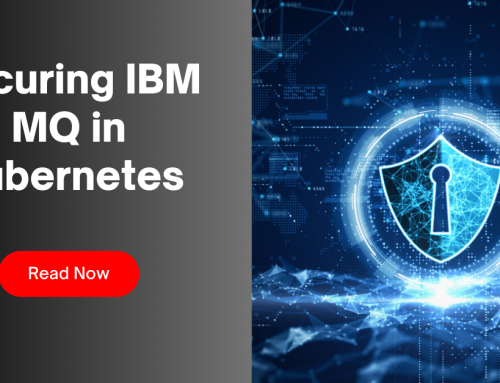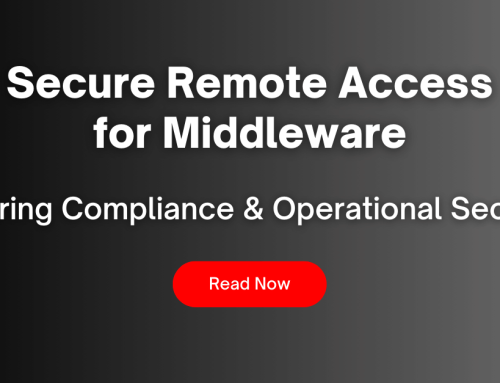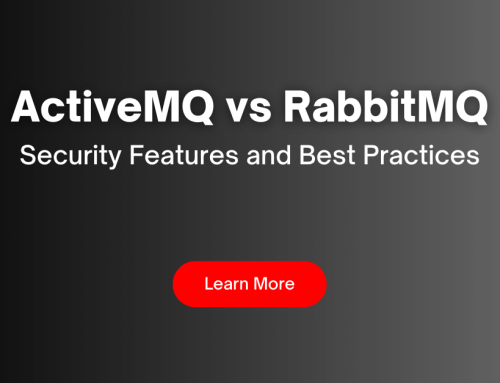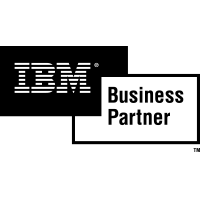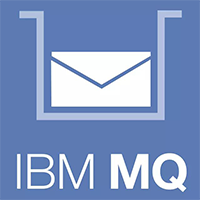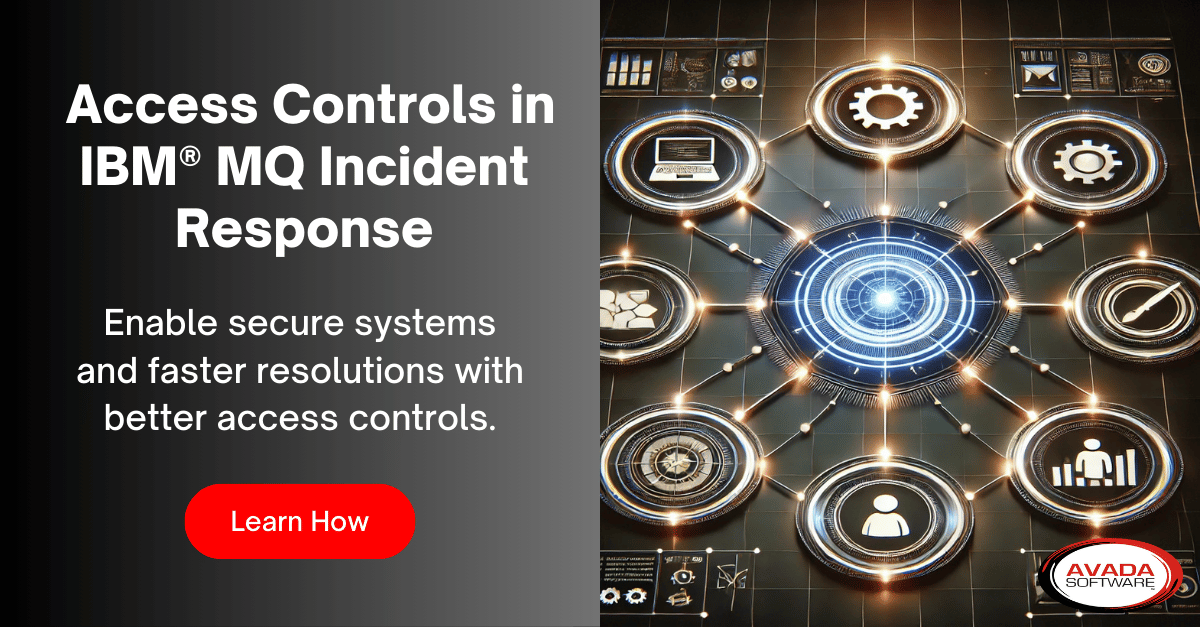ActiveMQ® vs RabbitMQ™: Unveiling the Best Messaging Solution for Your Enterprise Needs
Message queuing is pivotal in modern IT infrastructures, promoting asynchronous communication that boosts efficiency and reliability. These systems are essential for enterprise applications, ensuring robust data exchange even during system failures—key to maintaining data flow integrity.
Advancements in Message Queuing
Continual advancements have rendered message queuing crucial across various industries, such as finance and telecommunications, emphasizing the need for proactive monitoring to avoid data bottlenecks and system downtimes.
ActiveMQ and RabbitMQ: An Overview
Both ActiveMQ and RabbitMQ are leading message queuing solutions, but they cater to slightly different needs and use cases within the enterprise.
ActiveMQ: Offers extensive protocol support and customization flexibility, ideal for diverse system integration. Strong community support under the Apache Software Foundation enhances troubleshooting and optimization capabilities.
RabbitMQ: Best suited for environments requiring high throughput and low latency, such as real-time analytics and high-speed trading, thanks to its efficient implementation of the AMQP protocol.
Deep Dive into ActiveMQ
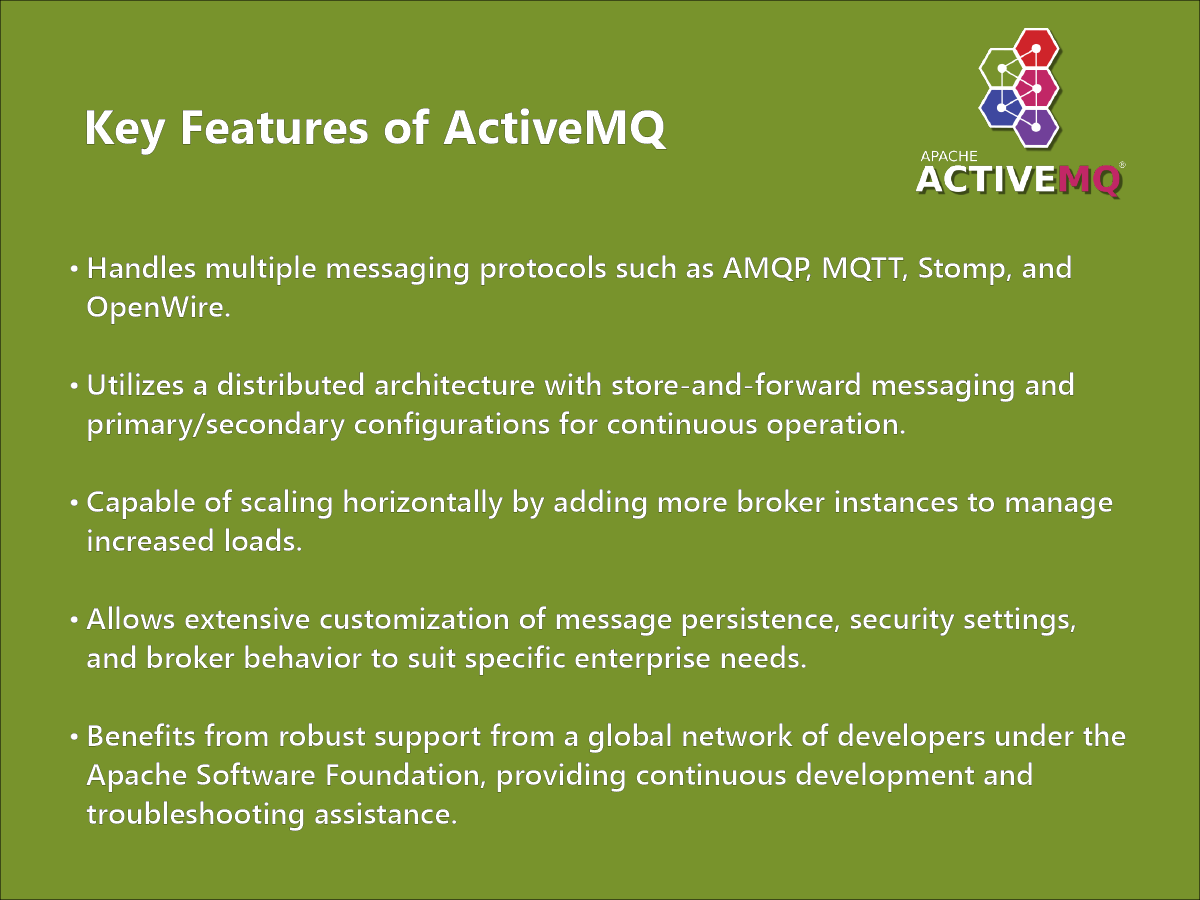
ActiveMQ is a powerful message broker known for its broad protocol support and scalability, making it an ideal choice for diverse enterprise environments.
Supporting a Multitude of Protocols
ActiveMQ stands out by supporting multiple messaging protocols, including:
- AMQP
- MQTT
- Stomp
- OpenWire
This capability ensures that ActiveMQ can be integrated into various systems, addressing a range of use cases from Internet of Things (IoT) communications to traditional enterprise messaging needs.
For example, IoT devices using MQTT can seamlessly communicate with enterprise backends running on AMQP, showcasing ActiveMQ’s flexibility and versatility.
Ensuring High Availability and Scalability
One of ActiveMQ’s key strengths is its robust support for high availability and scalability. Key features include:
- Distributed Architecture: Incorporates store-and-forward messaging and primary/secondary configurations
- Reliability During Failures: Ensures data integrity and continuous service, critical for 24/7 operations
- Scalability: Ability to scale horizontally by adding broker instances as demand increases
ActiveMQ in Enterprise Environments
ActiveMQ’s adaptability and strong community support make it particularly suitable for complex enterprise messaging systems.
Configurability and Flexibility
In the enterprise sphere, ActiveMQ excels due to its high configurability. It allows customization of virtually every aspect of its operation, from message persistence and security settings to broker behavior and performance tuning. This level of configurability empowers system architects and developers to fine-tune the message broker to fit their specific requirements perfectly, enhancing overall system efficiency.
Leveraging Community Support
ActiveMQ benefits significantly from its robust and active community. As part of the Apache Software Foundation, it enjoys strong support from a worldwide network of developers contributing to its ongoing development and troubleshooting.
This community provides:
- Extensive Resources: Including documentation, forums, and user guides.
- Rapid Response to Vulnerabilities: Ensures ActiveMQ remains secure and reliable.
Understanding RabbitMQ
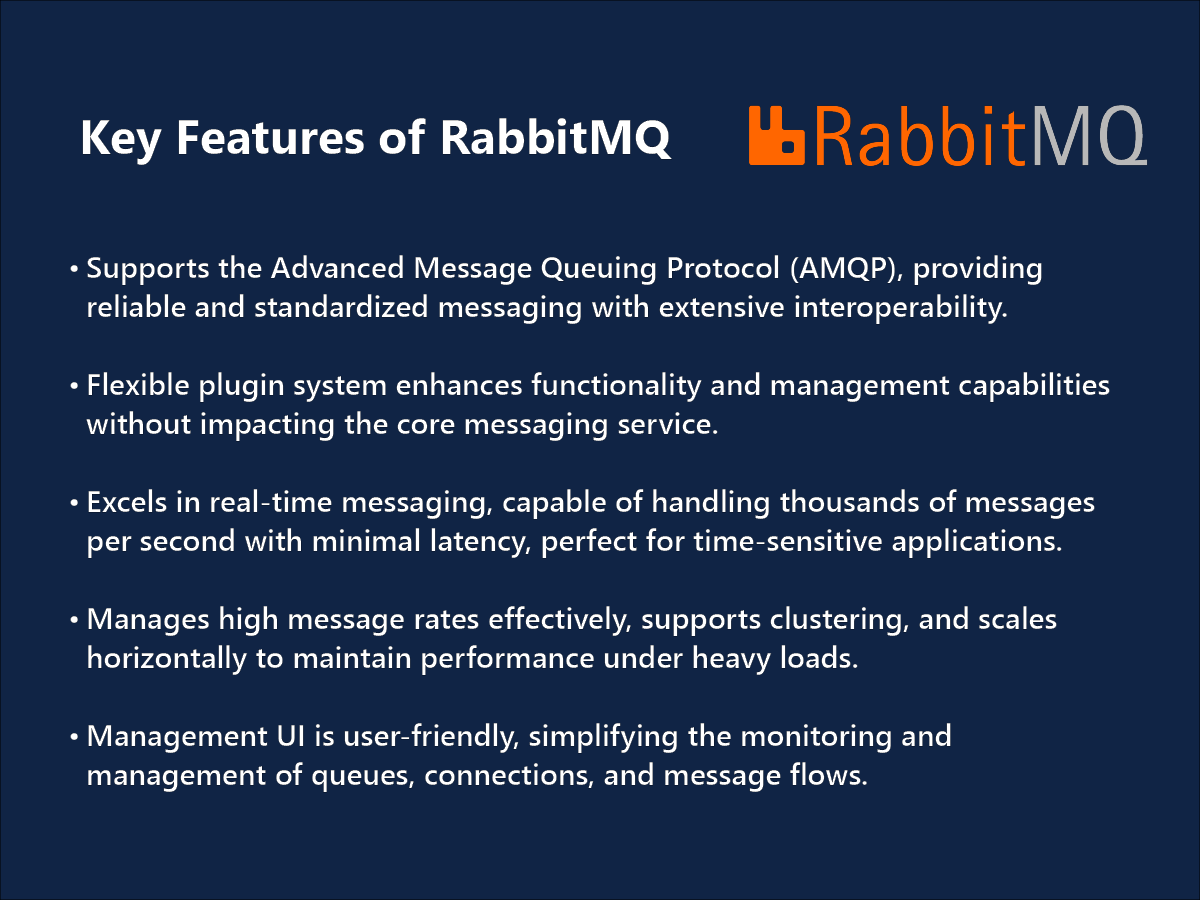
Key Features of RabbitMQ
RabbitMQ is renowned for its robust support of the Advanced Message Queuing Protocol (AMQP) and flexible plugin system, which makes it highly adaptable to a variety of business needs.
Emphasizing AMQP Support
RabbitMQ’s implementation of AMQP offers a reliable and standardized messaging backbone, ensuring interoperability among different systems. This support allows RabbitMQ to handle complex messaging patterns across diverse environments efficiently. Essential features supported include:
- Message Queuing
- Routing
- Reliability
- Security
These features are crucial for enterprise applications that require dependable data flow management.
Utilizing the Plugin System and Management UI
RabbitMQ’s extensible plugin system enhances its functionality and management capabilities, enabling:
- Customized management interfaces
- Integration with other tools and platforms
- Message tracking
The management UI provides a user-friendly interface for monitoring and managing queues, connections, and message flows, which is crucial for maintaining the health and performance of business-critical applications.
RabbitMQ Application Scenarios
RabbitMQ is particularly effective in:
- Real-time Messaging Capabilities: Excelling in scenarios like financial transactions or live updates in web applications, RabbitMQ can handle thousands of messages per second with minimal latency.
- Handling High Throughput: Ideal for high-throughput scenarios, RabbitMQ supports clustering and horizontal scaling, distributing workloads effectively across multiple nodes to maintain consistent performance under increasing demands.
Comparative Analysis: ActiveMQ vs. RabbitMQ
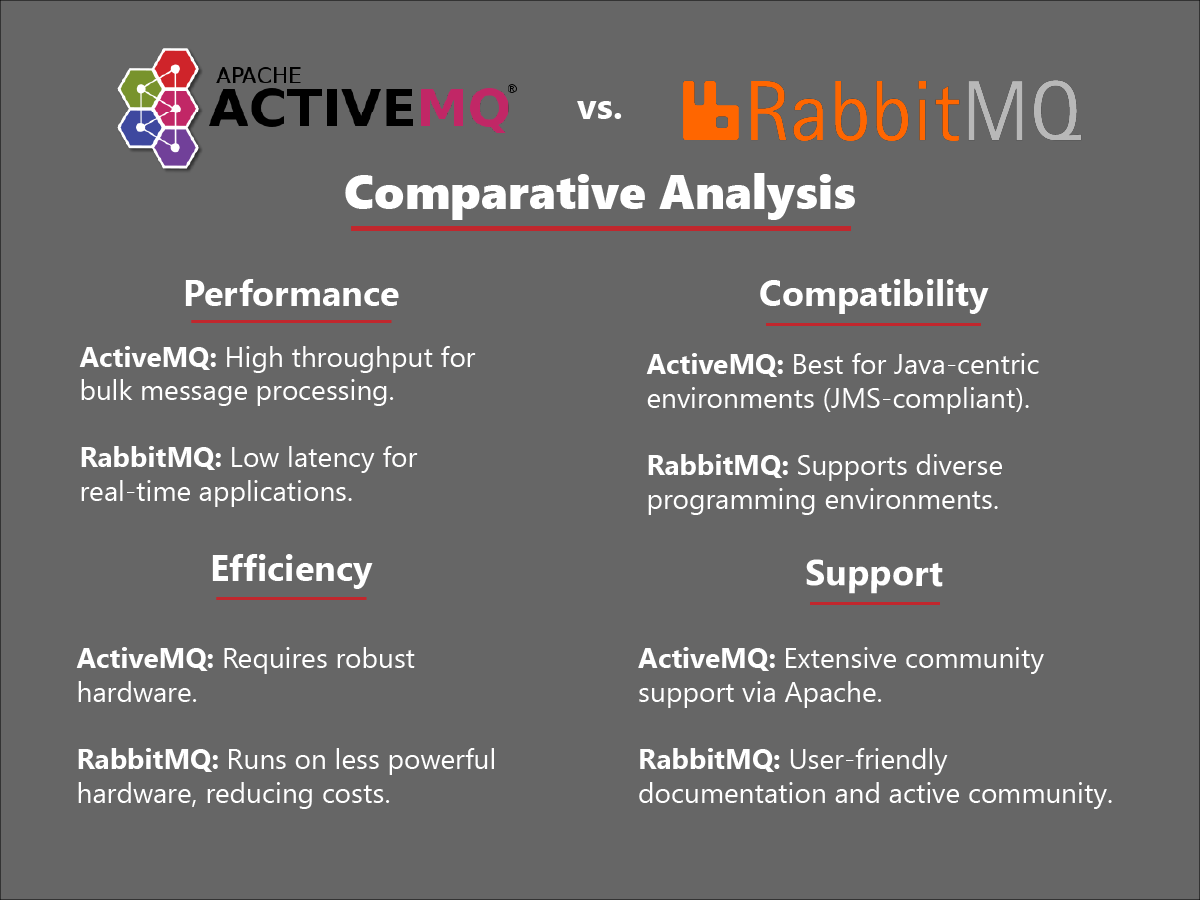
Performance Comparison
In this section, we examine the performance metrics of ActiveMQ and RabbitMQ, focusing specifically on throughput, latency, message reliability, and delivery assurance, which are essential for choosing the right messaging solution.
Throughput and Latency
ActiveMQ and RabbitMQ both offer robust performance, but they excel in different scenarios.
- ActiveMQ boasts high throughput capabilities, allowing it to process large volumes of messages quickly.
- RabbitMQ excels in low-latency metrics, making it ideal for real-time messaging applications that demand immediate response times.
For example, RabbitMQ consistently demonstrated lower average latency in a controlled test environment than ActiveMQ when handling standard messaging workflows.
Message Reliability and Delivery Assurance
Both messaging systems provide strong guarantees regarding message reliability and delivery.
- ActiveMQ offers persistent and non-persistent delivery modes to prevent message loss during processing.
- RabbitMQ offers similar reliability through its message acknowledgments and durable queues, ensuring messages survive broker restarts.
The choice between the two may be specific project requirements or organizational preferences.
Ease of Integration and Configuration
The ease with which these systems can be integrated with existing infrastructure and their configuration flexibility can significantly impact an organization’s choice.
System Compatibility
- ActiveMQ boasts broad compatibility with multiple JMS-compliant systems, simplifying integration in a Java-centric environment.
- RabbitMQ, while not JMS compliant by default, supports a wide range of programming languages and platforms through its AMQP protocol, making it highly adaptable for diverse technological ecosystems.
Community and Documentation
Both platforms are well-supported in community support and documentation, with active communities and extensive documentation. However, RabbitMQ slightly edges out with its more user-friendly documentation and extensive third-party tutorials and resources.
Cost and Resource Efficiency
Understanding the total cost of ownership, including hardware and maintenance costs, and the impact on developer resources is critical for making an informed choice.
Hardware and Maintenance Costs
- ActiveMQ requires more robust hardware for handling higher throughput scenarios, which might increase the initial investment in infrastructure.
- RabbitMQ, with its efficient message handling algorithms, is more lightweight and can run effectively on less powerful hardware, potentially reducing hardware costs.
Developer Resource Allocation
ActiveMQ and RabbitMQ require similar developer expertise for initial setup and maintenance.
However, RabbitMQ’s extensive plugin ecosystem allows for easier customization and extended functionality without extensive developer intervention, which can reduce long-term development costs.
Why Opt for ActiveMQ over RabbitMQ?
Addressing Diverse Operational Demands
Enterprises favor ActiveMQ for its flexibility and strong ecosystem, which makes it highly adaptable to diverse operational needs.
- Diverse Communication Support: ActiveMQ supports various messaging protocols like AMQP, MQTT, and JMS, facilitating a range of communication patterns from point-to-point to publish-subscribe, enhancing adaptability across different systems and applications.
- Large Message Handling: It efficiently manages large message sizes, crucial for industries with significant data needs, such as finance and telecommunications. This reduces the need for message segmentation, simplifying processes and ensuring message integrity under load.
Stability and Ecosystem Maturity
- Established Ecosystem: ActiveMQ boasts a long-standing presence in the market with a mature ecosystem.
- Robust Community Support: Developed by the Apache Software Foundation, it benefits from a vast community and provides a stable and Ongoing
- Improvements and Support: The commitment to long-term support by the Apache community ensures continuous updates and technological relevance, safeguarding investments in the platform.
ActiveMQ delivers superior integration capabilities and the security of a robust, actively-maintained platform
Maximizing ActiveMQ Management with Infrared360®
Infrared360 by Avada Software elevates ActiveMQ management with its comprehensive suite of tools, designed to streamline operations, bolster security, and provide deep insights.
Exploring Infrared360’s Capabilities
- Intuitive Monitoring Dashboard: Visualize the health of your entire ActiveMQ infrastructure at a glance. Monitor brokers, queues, message flows, and vital metrics from a customizable, centralized dashboard.
- Effortless Configuration Management: Modify ActiveMQ settings without navigating complex files. Infrared360’s interface simplifies configuration, reducing errors and saving valuable time.
- Automated Workflows: Boost efficiency by automating routine tasks. Create custom workflows to streamline your operations.
- Historical Analysis and Trend Reporting: Uncover hidden patterns and optimize message flows using Infrared360’s in-depth analytics, allowing informed decisions for improved performance.
Security and Compliance Enhancements
- Robust Encryption: Safeguard sensitive message data in transit and at rest with advanced encryption protocols.
- Fine-Grained Access Controls: Enforce security policies by managing user permissions and restricting access to sensitive ActiveMQ components.
- Audit Trails and Compliance Reporting: Demonstrate compliance with ease. Infrared360 maintains detailed logs of all changes and accesses, simplifying audit processes.
Advantages of Infrared360 for ActiveMQ Users
Streamlining Management Processes
- Proactive Problem Resolution: Infrared360’s proactive alerting system notifies you of potential issues before they escalate, maximizing uptime and minimizing disruptions.
- Integration with Existing Systems: Seamlessly connect Infrared360 to your ticketing and monitoring tools for a unified IT management experience.
Utilizing Advanced Analytics
- Predictive Insights & Optimized Message Flows: Analyzes performance to anticipate bottlenecks and refine message handling for improved throughput and reliability.
Concluding Thoughts and Final Recommendations
Our in-depth comparison of ActiveMQ and RabbitMQ reveals ActiveMQ as the ideal choice for enterprises seeking flexibility, extensive community support, and adaptability to complex messaging requirements. Its broader protocol support and well-established Apache ecosystem make it a reliable long-term solution. If you’re using ActiveMQ, consider integrating Infrared360 to gain powerful management tools, in-depth analytics, and enhanced security – streamlining operations and maximizing ActiveMQ’s potential!
The Importance of Selecting the Right MQ Tool
Selecting the optimal messaging queue tool is essential for seamless data flow and uncompromised system reliability within your IT environment. For organizations prioritizing adaptability and a proven track record, ActiveMQ stands out. Further elevate ActiveMQ’s capabilities with Infrared360’s monitoring solutions – unlocking scalability, stability, and peace of mind.
Engage with Infrared360!
More Infrared360® Resources



